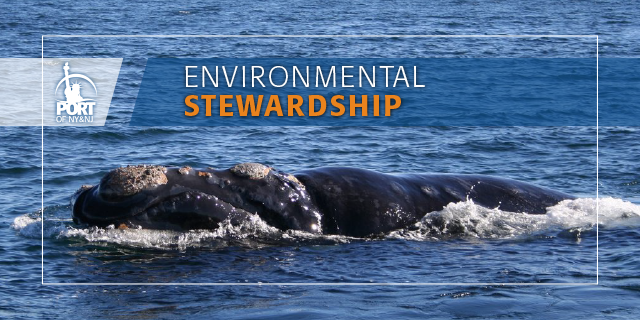To mark this weekend’s celebration of Earth Day 2017, the Port Authority today announced two new environmental initiatives to supplement several existing programs to further reduce emissions and improve air quality around the Port of New York and New Jersey.
Under one initiative, the agency will launch a demonstration project with GCT New York and APM Terminals to retrofit two yard tractors for each facility with auto stop-start hybrid technology. Yard tractors account for the largest number of on-terminal vehicles in the port and contribute to 33 percent of all cargo-handling equipment emissions. The Port Authority will reimburse each terminal up to $72,000 for the costs of the retrofits, which are expected to reduce greenhouse gas emissions by an estimated 25 percent.
The one-year demonstration project will include the collection of monitoring data from the retrofitted yard tractors, which will be used by the Port Authority to evaluate the performance of the stop-start systems, operational savings, air emissions reductions and commercial viability of the technology.
The Port Authority also will sponsor a four-week demonstration project of zero-emission cargo handling equipment at the Red Hook Container Terminal in Brooklyn to explore the air emissions reductions and the ability to operate zero emission vehicles in a container terminal environment. The pilot project will begin on April 24.
Since 2006, following the implementation of several major environmental initiatives, the port has realized a 65-percent reduction in particulate matter, and a 24-percent reduction in nitrogen oxides emissions despite a 25 percent increase in cargo volume. As a result of its seaport environmental initiatives, the Port Authority received the EPA sponsored Northeast Diesel Collaborative’s Breathe Easy Leadership Award in 2012.
“Our goal is to balance the need to efficiently and effectively #deliveringthegoods within our port facilities, as well as to its final destination, while continuing to be good environmental stewards to the communities that surround our port facilities,” said Port Department Director Molly Campbell. “These new programs will supplement other major initiatives we have in place that address emissions reductions and air quality for those who live and work in the port community.”
“As the technology leader in terminal operations and the first Green Marine certified facilities in the harbor, this initiative aligns with our goal to improve efficiency while minimizing our environmental footprint,” said John Atkins, President of GCT USA. “As our terminals continue to expand, we are committed to focus on ensuring our operations and equipment support our vision of a sustainable future.”
“With larger vessels and increased container volumes handled in shorter time frames, the need to identify and implement more environmentally sustainable terminal operating procedures and equipment has become increasingly important here at the Port of NY & NJ, and elsewhere, and we are glad to play a leading role in this pilot project to increase fuel efficiency, and reduce emissions while expanding our services to customers,” said APM Terminals Port Elizabeth Managing Director Brian Clark. “Over the last two years, APM Terminals has replaced 132 container yard trucks with new models. We have also replaced a large percentage of our top loader and empty handler fleet with the latest, more efficient engines.”
In addition to the new programs, the Port Authority has already undertaken the following environmental initiatives:
- GCT Bayonne rolled out a new truck management system, or “appointment system,” in January that is designed to improve productivity and terminal capacity while working to decrease emissions.
- The Environmental Protection Agency Region 2 and Port Department held a Port Environmental Listening Session on December 8, 2016. The purpose of the listening session was to obtain the views and solicit information of all interested and affected stakeholders to help develop the latest framework of a collaborative plan to reduce port related air emissions and improve air quality for port workers and residents who live nearby. There were more than 100 participants from academia, community and environmental groups, elected and government officials and maritime industry stakeholders in attendance.
- The Port Authority launched a cargo-handling equipment fleet modernization program in the fourth quarter of 2016. The federally funded program will incentivize the replacement of 100 pieces of equipment with all electric, hybrid, alternative energy powered, or the cleanest Tier IV engine.
- As of March 1, 2016, only trucks equipped with cleaner engines that meet or exceed federal EPA emission standards for heavy duty diesel-fueled engines shall be permitted to complete RFID registration to service the Port.
- The Port Authority continues to support the truck replacement program. The program is funded by Port Authority, Congestion Mitigation and Air Quality Improvement (CMAQ), and Diesel Emission Reduction Act (DERA) funds. The combined $8 million in funds aims to replace older trucks with newer, more efficient trucks that are at least 90 percent cleaner in terms of tailpipe emission.

